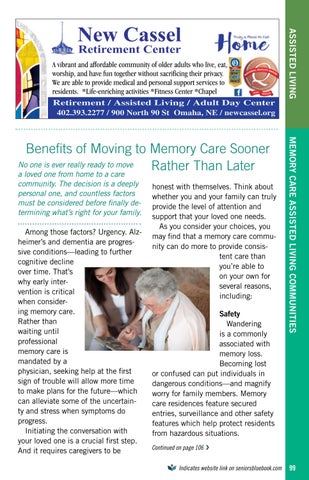ASSISTED LIVING
community. The decision is a deeply personal one, and countless factors must be considered before finally determining what’s right for your family.
Among those factors? Urgency. Alzheimer’s and dementia are progressive conditions—leading to further cognitive decline over time. That’s why early intervention is critical when considering memory care. Rather than waiting until professional memory care is mandated by a physician, seeking help at the first sign of trouble will allow more time to make plans for the future—which can alleviate some of the uncertainty and stress when symptoms do progress. Initiating the conversation with your loved one is a crucial first step. And it requires caregivers to be
honest with themselves. Think about whether you and your family can truly provide the level of attention and support that your loved one needs. As you consider your choices, you may find that a memory care community can do more to provide consistent care than you’re able to on your own for several reasons, including: Safety Wandering is a commonly associated with memory loss. Becoming lost or confused can put individuals in dangerous conditions—and magnify worry for family members. Memory care residences feature secured entries, surveillance and other safety features which help protect residents from hazardous situations.
MEMORY CARE ASSISTED LIVING COMMUNITIES
Benefits of Moving to Memory Care Sooner No one is ever really ready to move Rather Than Later a loved one from home to a care
Continued on page 106 Indicates website link on seniorsbluebook.com
99










